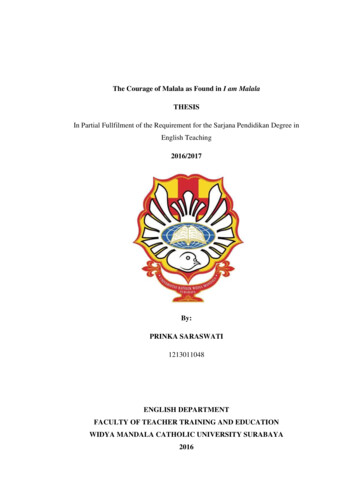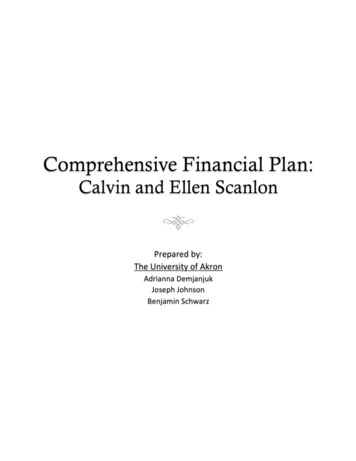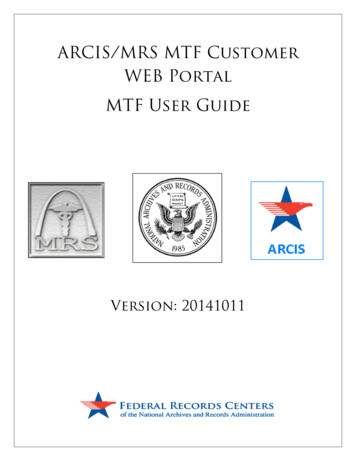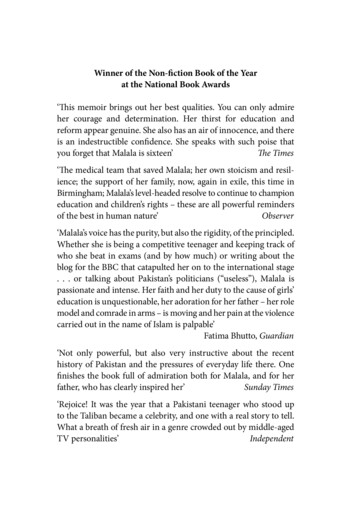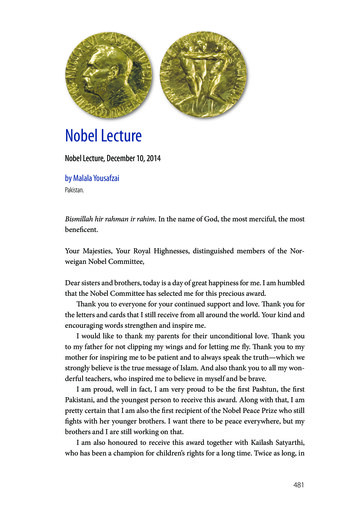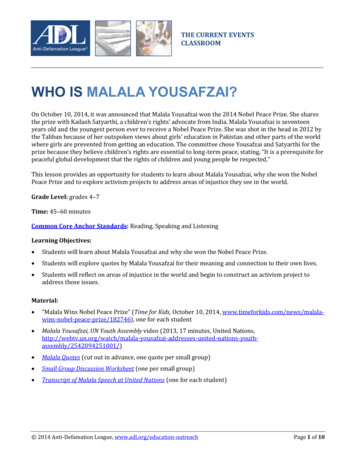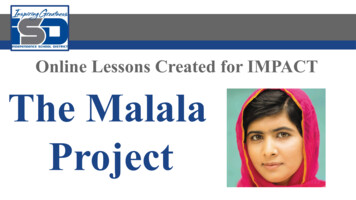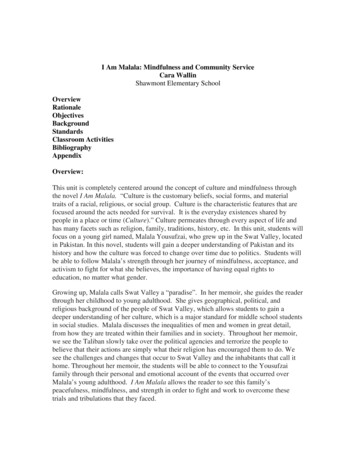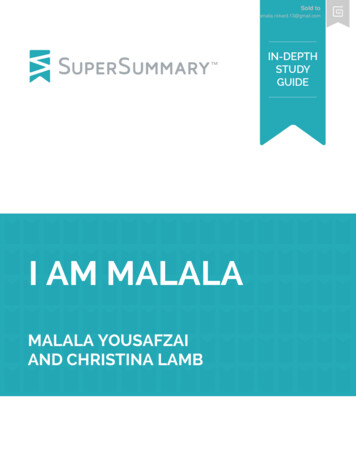
Transcription
Sold toamalia.rickard.13@gmail.comI AM MALALAMALALA YOUSAFZAIAND CHRISTINA LAMB
I AM MALALASUPERSUMMARY1TABLE OF CONTENTSPLOT OVERVIEW2CHAPTER SUMMARIES AND ANALYSES4Prologue-Chapter 3Chapters 4-8Chapters 9-11Chapters 12-15Chapters 16-20Chapters 21-Epilogue4812161922MAJOR CHARACTER ANALYSIS27MalalaZiauddin, Malala’s fatherFazlullahToor Pekai, Malala’s motherThe Taliban2727282828THEMES29SYMBOLS AND MOTIFS31IMPORTANT QUOTES33ESSAY TOPICS40COPYRIGHT 2016
I AM MALALASUPERSUMMARY2PLOT OVERVIEWMalala Yousafzai was born a little different. From the beginning, her father, Ziauddin,treated her differently than most fathers in Swat, Pakistan treated their daughters. Heput her on the family tree, a position usually reserved for the men in the family andnicknamed her Jani Mun, or soulmate.Her father worked hard to found a successful school. He met roadblocks severaltimes, but eventually opened a school he could maintain. Ziauddin had longed to learnever since he was a child. Though he once wanted to become a militant Muslim, herealized his error. Without much support from his family, he went away to college.There, he became a great public speaker and debater. His education pushed him topursue public debate and advocacy. Through his desire to bring change to his country,he spoke about education, the environment, and government. He ruffled feathers, butnever backed down.The Swat Valley in Pakistan faced many challenges throughout Malala’s life, includingan earthquake, a takeover by the Taliban, a military operation, and flooding.Infrastructure was ruined and culture destroyed when Buddhas were blown up andpeople murdered. The Taliban and others threatened Malala and her family’s beliefsabout education and women’s rights. With the increasing challenges faced by thevalley came increased pressure on Malala and her father to stop advocating foreducation. Even Malala’s extended family sees her as a “modern” girl and fears for hersafety.Malala works hard to learn. She competes with two of her classmates and tries to beatthem at everything. When she is unable to be the best in the class, she is sad and vowsto try harder. Eventually, she understands it is not about the grades, but about whatshe is learning. As she gets older, she becomes more involved with the media. Sheanonymously blogs for BBC about living under the Taliban. She is the star of adocumentary featuring girls attending school during a Taliban ban on femaleeducation. She even becomes a spokesperson for girls’ education, with media outletslooking to her for statements and interviews.The attention on her and her family results in threats. Everyone assumes her fatherwill become a target. His friends, also outspoken, are shot one by one. He stays awayfrom the house sometimes to keep the family protected. However, little did the familyknow, Malala has become the real target, despite her youth.COPYRIGHT 2016
I AM MALALASUPERSUMMARYOn the way to school one day, Malala’s bus is stopped. She is shot in the head. Theflurry after the gunshots moves her from one hospital to another. She goes fromPakistan to England. There, she slowly recovers. Her family joins her. Unfortunately,they have yet to return to Pakistan for fear of another attack. The situation in Swathas gotten worse.STEVEN GALLOWAYCOPYRIGHT 20163
I AM MALALASUPERSUMMARY4CHAPTER SUMMARIES AND ANALYSESPrologue-Chapter 3Prologue: The Day My World ChangedMalala Yousafzai begins her story by saying, “I come from a country that was createdat midnight. When I almost died it was just after midday” (3). She describesherhomeland and contrasts the modern conveniences of England with the less-thanmodern difficulties of Swat Valley in Pakistan. On Tuesday, October 9, 2012, Malala’slife changed. She was on the way to school. The school was founded by her fatherbefore she was born.Malala explains her father used to wake her up for school. His nickname for her is JaniMun, which means “soulmate.” In her house, she keeps “gold-colored plastic cups andtrophies” because only “a few times had I not come top [sic]” (6). Although theschool was not too far away, her mother feared for Malala’s safety. Instead ofwalking, Malala took a bus. This fear stemmed from the murder of her father’s fellowcampaigner Zahid Khan. Even Malala worried she might be shot, although she did notconsider her worry to be the same as fear.On the way to school one day, the bus is stopped. A man asks the driver if this is theKhushal School bus. The driver says yes. When the man asks about the children on thebus, the driver directs him to the office to get information. Another man hops ontothe back of the bus and demands, “Who is Malala?” Although no one says anything,the other girls look at her. The man shoots her three times, one bullet hitting her, andthe other two bullets hitting two other girls.Part One: Before the TalibanChapter 1 Summary: A Daughter is Born“I arrived at dawn as the last star blinked out. We Pashtuns see this as an auspicioussign” (13). Malala is born, but no one congratulates her father because the birth of adaughter is not celebratory in Swat. One of Malala’s father’s cousins comes tocelebrate the birth. With him, the cousin brings a family tree containing only the menof the family. Her father “took the tree, drew a line like a lollipop from his name and atCOPYRIGHT 2016
I AM MALALASUPERSUMMARY5the end of it he wrote, ‘Malala’” (13). The cousin is in disbelief, but Malala’s fatherdoes not care. Malala is named after a great Afghani heroine.Malala explains that she was born in Swat, a beautiful area full of flowers and trees.Although Swat was a part of Pakistan, it retained autonomy. Before Islam came toSwat in the eleventh century, Swat residents often followed Buddhism. The religiousbackbone created a region of reverent followers. Malala paints a picture of her fatherwriting poems about temples and mosques side by side.Malala’s family has humble beginnings. Her father and one of his friends founded aschool, and the family was quite poor because of the cost. However, despite theundesirable financial situation, Malala’s parents’ relationship began in an unexpectedway. Although most marriages were arranged, Malala describes her parents’ marriageas a “love match” (21). Her mother’s father was not impressed and refused to acceptthe proposal, at first. However, Malala’s father did not give up, and eventually, themarriage was agreed upon.Malala further describes her parents’ relationship as unusual. Her father shares histhoughts and fears with her mother, something unheard of: “Most Pashtun mennever do this, as sharing problems with women is seen as weak” (22).Malala finishes a brief history of her people. She tells of her ancestors coming to Swatafter helping an emperor win back his throne. Unfortunately, the emperor waspersuaded by his friends to remove the Yousafzai (Malala’s ancestors and tribe)because they were too powerful. He agreed and slaughtered hundreds of chiefs. Twoescaped and found themselves in Swat, where they decided to rebuild. The Yousafzaibuilt a reputation and cycled through leaders before finally settling on Badshah Sahib,a man who eventually brought peace to their valley.Chapter 2 Summary: My Father the FalconMalala tells her father’s story, beginning with a frustrating impediment he worked tofix: his voice. “A stutter was a terrible thing for a man who so loved words andpoetry” (27). Her grandfather often became frustrated with her father, telling him toget his words out. Rather than let the problem dictate his life, her father entered apublic speaking contest as a teenager.COPYRIGHT 2016
I AM MALALASUPERSUMMARY6While he attended school, his sisters stayed home. “School wasn’t the only thing myaunts missed out on. In the morning when my father was given a bowl of cream withhis tea, his sisters were given only tea. If there were eggs, they would only be for theboys” (29).As a child, her father witnessed Zia ul-Haq’s rise to power. He took over Pakistan,executed an elected prime minister, and demanded support “because he waspursuing Islamic principles” (30). Further, ul-Haq’s control resulted in severerestrictions for women. After the Russians invaded Afghanistan, boys in her father’sdistrict went off to fight. Jihad became a regular idea, perpetuated, according to herfather, by the CIA—textbooks from an American university taught arithmetic throughfighting.When her father became a teenager, he dreamed of becoming a jihadist. “For a whilehis Muslim identity seemed more important than anything else in his life” (34).However, after Malala’s father met her mother’s family, his leanings shifted. Hebecame interested in going to school. Despite choosing a good option for his future,his father encouraged older students to hold on to old books rather than buying newbooks. At the public speaking event, her father took the stage and commandedattention. He did not stutter once. Finally, hergrandfather was proud of her father.Chapter 3 Summary: Growing Up in a SchoolMalala begins to tell her mother’s story and continues her father’s story. Her mother’sfamily encouraged her to go to school. However, after leaving for school several timesand seeing her cousins stay at home to play, Malala’s mother decided to stop going.She regretted her decision to quit after she met Malala’s father. Malala’s fatherbelieved “there was nothing more important than knowledge” (41). He worked hardto become a teacher despite his father’s dream of him becoming a doctor.Her grandfather refused to fund her father’s education. Regardless, her father found away to pay for it himself. He traveled and “It was in Spal Bandit that [he] cameacross women who had great freedom and were not hidden away as in his ownvillage” (44). When he arrived at college, Malala’s father lucked out—he was able toattend student organizations, which were once banned under General Zia. He becamea good debater and speaker.COPYRIGHT 2016
I AM MALALASUPERSUMMARY7When he spoke, Malala’s father went against the grain. While others complained andpetitioned against Salman Rushdie’s The Satanic Verses because his supposed antiIslamic writings, Malala’s father suggested: “First, let’s read the book and then whynot respond with our own book” (46). After he graduated, he began working as anEnglish teacher. He soon partnered with a friend and hoped to open his own school.His first school failed, “which perhaps should have made them think twice” (47).He followed his passion and opened yet another school. He encountered difficultieswhen he realized government officials expected bribes. In response, Malala’s fatherfounded an organization of school principals. They spoke out against bribes and infavor of making education accessible. Soon after founding a school, Malala’s mothermoved in with her father. After that, Malala’s mother became pregnant. The baby wasstillborn, and Malala’s father continued to lose money.A flood destroyed their home and school, but Malala’s father did not despair. Soon,Malala was born on July 12, 1997. Her father’s partner remarked: “Malala was a luckygirl .When she was born our luck changed” (55). Her father opened another school.Malala grew and began spending time in the classrooms. Their life, however, wasabout to change in another way. Word came in that Muslim terrorists had flownplanes into the World Trade Center in New York City.Prologue – Chapter 3 AnalysisFrom the beginning of Malala’s story, perseverance is an important theme. She tellsher father’s story, a man who persists through hardships despite harsh realities. Hepersists after being rejected by her mother’s family, and he eventually wins hermother’s hand in marriage. Similarly, although her grandfather did not support herfather’s college pursuits, refusing to fund his college tuition. Despite this, Malala’sfather persevered. Once out of school, he finds it difficult to keep a school running butrefuses to give up. Perseverance, it seems, is a Yousafzai trait. Her ancestors escapedslaughter and founded a new society in Swat. After several leaders failed, a kingbrought peace to the valley.Going against the grain runs in the family, too. The prologue follows Malala from herbirth to the moment she is shot. One detail she mentions in the moments before herinjuries is: “I was the only girl with my face not covered” (9). Malala is raised in anunusual home. Her father, Ziauddin, “is different from most Pashtun men” (13). Thesedifferences permeate his life and story. He questioned his teachers as a child,COPYRIGHT 2016
I AM MALALASUPERSUMMARY8something looked down upon in traditional Pakistani society. He believes in thinkingoutside the box, questioning things, and creating an individual opinion. Similarly, heshares his thoughts and fears with Malala’s mother, something equally unheard of. Totop it off, he adds Malala to an all-male family tree after she is born. Fighting societaltrends becomes a family affair.Chapters 4-8Chapter 4 Summary: The VillageMalala became close with her paternal grandfather, who she calls Baba. Duringholidays, the family travels to see his village by bus. The paddy fields and lush greenorchards turn to chemical-laden streams. The village sat between the White Mountainand the Black Mountain. Malala says her father thought the White Mountain was “asymbol of peace for our land, a white flag at the end of our valley” (62). She describesthe village as a poor, crumbling place.Malala also describes the differences between her and her cousins. “My cousins madefun of me for my city ways” (64). She wore shoes, read books, and had a differentaccent. “They thought I was modern because I came from town” (64). Her cousinsand she play marriage—putting makeup on and marrying one of the girls away. “Once[the bride] was ready, [she] would start crying and we would stroke her hair and try toconvince her not to worry. ‘Marriage is a part of life,’ we said’” (65).The women in the village cover their faces. Malala does not. “One of my male cousinswas angry and asked my father, ‘Why isn’t she covered?’ He replied, ‘She’s mydaughter. Look after your own affairs.’ But some of the family thought people wouldgossip about us and say we were not properly following Pashtunwali” (66). Despitethe injustices Malala sees other women facing, her father assures her things wereworse for women in Afghanistan—girls’ schools were burned. Her father furtherassures her by saying, “I will protect your freedom, Malala. Carry on with yourdreams” (68).Chapter 5 Summary: Why I Don’t Wear Earrings and Pashtuns Don’t Say Thank You“By the age of seven I was used to being the top of my class” (69). Malalacompeteswith her good friend, Moniba. When a new girl, Malka-e-Noor joins the class,she thinks little of it, until Malka-e-Noor receives top marks on the year-end exams.COPYRIGHT 2016
I AM MALALASUPERSUMMARY9The incident hurts Malala, and she cried. Around the same time, Malala and her familymoved to a different neighborhood. She meets Safina, a younger girl.Malala plays with a fake cellphone her father bought her. It disappears, and one day,Safina plays with one that looks like Malala’s. Malala begins to steal Safina’s things andfinds it thrilling. However, she is caughtand her mother refuses to speak to her. “It’shorrible to feel unworthy in the eyes of your parents” (71).After that day, Malala did not steal or lie. She stops wearing jewelry. “What are thesebaubles which tempt me? Why should I lose my character for a few metal trinkets?”(72). Her father comforts her by talking about the mistakes others have made.Malala enters a public speaking event. Her father writes her speech. “We thoughtspeaking in English meant you were more intelligent. We were wrong of course. Itdoes not matter what language you choose, the important thing is the words you useto express yourself” (78). Malala loses the event to Moniba. Instead of sadness,Malala realizes she must sometimes lose.Chapter 6 Summary: Children of the Rubbish MountainMalala’s family moves again as the school attracts more students. The increase inattendees meant Malala’s family could buy a TV. Her favorite show features a boy witha magic pencil. “At night I would pray, ‘God, give me Sanju’s pencil. I won’t tellanyone. Just leave it in my cupboard. I will use it to make everyone happy’” (80). Inparticular, Malala wants to help the children who rummage through the rubbishdump. Malala begs her father to give the children free entrance to school.Unfortunately, her father explains they were likely their family’s lifelines.However, her father usually gave away free spots. “Giving places to poor childrendidn’t just mean my father lost their fees. Some of the richer parents took theirchildren out of the school when they realized they were sharing classrooms with thesons and daughters of people who cleaned their homes or stitched their clothes” (83).Her father does not make much money. Regardless, he finds time to promote otherendeavors. “Aside from corruption and bad government, my father’s main concern inthose days was the environment” (84). Malala describes him promoting peace andeducation through his organization. He also writes poetry about controversial topics.COPYRIGHT 2016
I AM MALALASUPERSUMMARY10After 9/11 the Pashtuns found themselves torn between two evils. On one side is theTaliban, and on the other is the Americans bombing Afghanistan. Malala points outsome people called Osama bin Laden a hero, but she suggests they forgot “the HolyQuran clearly says it is wrong to kill” (86).Despite the global issues enclosing around the valley, Malala and her father focus onlocal issues. “I was more concerned with matters closer to home—our own street tobe exact. I told my friends at school about the rubbish dump children and that weshould help” (88). She writes a letter to God, hoping He would help, and puts theletter in the river with the hope it would reach God.Chapter 7 Summary: The Mufti Who Tried to Close Our SchoolConflict arises regarding her father’s school. A religious authority, a mullah namedGhulamullah “called himself a mufti, which means he is an Islamic scholar andauthority on Islamic law” (90). The man watched girls coming and going from theschool each day. Malala’s father fears the man watching the school is an ominous sign.Ghulamullah reaches out to the property owner and accuses Ziauddin of running aharam(forbidden) school. The owner refuses to take the building away and tellsMalala’s father to watch out for the mullah.Malala turns her narrative to her country’s history. “It could hardly have been abloodier beginning,” she says (91). Muslims flooded into the country from India andHindus ran away to India. Many died on their way to cross new borders. MuhammadAli Jinnah, their country’s founder, made a speech before independence, saying, “Youare free to go to your temples, you are free to go to your mosques or to any otherplace of worship in this State of Pakistan. You may belong to any religion or caste orcreed—it has nothing to do with the business of the state” (92). Despite the foundingwords, the country remained split and at war with itself. “Most Pakistanis are Sunnislike us—more than 80 percent—but within that we are again many groups” (93).The mufti gathers several elders and influential leaders and brings them to Malala’shouse. To Malala’s father, the man argues, “A girl is so sacred she should be in purdah,and so private that there is no lady’s name in the Quran, as God doesn’t want her to benamed” (94). Her father points out that Maryam’s (Mary’s) name is in the Quran, andhe tells the other men that the mufti refuses to greet him in the streets. The othermen explain they thought he was an infidel, but they notice all the Qurans in hishouse. Her father explains he will have the girls enter from another entrance. ItCOPYRIGHT 2016
I AM MALALASUPERSUMMARY11appeases everyone except the mufti, but he leaves. The hypocrisy of it all? The mufti’sniece attends the school.General Musharraf becomes the military leader and Malala considers him differentfrom past generals. He “abolished the law that stated that for a woman to prove shewas raped, she had to produce four male witnesses” (96). The new governmentbanned CDs and DVDs. They also “insisted women cover their heads. It was as if theywanted to remove all traces of womankind from public” (97).Soon, a local militant leader is bombed by the U.S. “Whatever you thought about NekMohammad, we were not at war with the Americans and were shocked that theywould launch attacks from the sky on our soil” (100). A local cleric “announced thatthe deaths would be avenged by suicide bombings” (100). Malala’s father and hisfriends call a peace conference. No one listens and her father comes home frustrated.“I have a school, but I am neither a khan nor a political leader. I have no platform .Iam only one small man” (101).Chapter 8 Summary: The Autumn of the EarthquakeOne day in October, an earthquake hits the valley. Malala is in school, and once theground stops shaking, her teachers send everyone home. Aftershocks continue duringthe day. “Every time we felt a tremor we thought it was the Day of Judgement” (103).The earthquake was 7.6 on the Richter scale. It devastated Pakistan. “Weremembered how scared we were that morning and started raising money at school.Everyone brought what they could” (104). General Musharraf declares the aftermath a“test of the nation” (105).Due to the ongoing conflict between Afghanistan and the United States, U.S.helicopters covertheir flag logos in order to drop aid without being attacked. OneIslamic organization, a front to a militant group, called Jamaat-ul-Dawa (JuD) beginstaking in children. “In our culture orphans are usually taken in by the extended family,but the earthquake was so bad that entire families had been wiped out” (107).Malala’s father tells her young boys are taken in by JuD and taught the Quran. Butthey also learn “that there is no such thing as science or literature, that dinosaursnever existed and man never went to the moon” (107).Finally, on top of the devastation, another group begins preaching about theearthquake being a sign from God. It warns people that women have become tooCOPYRIGHT 2016
I AM MALALASUPERSUMMARY12free. If the ways of women aren’t changed, the group pronounces, then punishmentwill be severe.Chapter 4-8 AnalysisThese chapters feature the oppression of women. Malala’s extended family views heras a “modern” girl because she doesn’t cover her face. In contrast, other women inthe family always cover their faces. Even the games Malala and her cousins playperpetuate the oppression of women—they play “marriage,” choosing who to marryoff, and explaining to them that it is simply the way things are done. When GeneralMusharraf enters the narrative, he is seen as good, at first. However, he soon insists allwomen cover their heads. Malala wonders if they are trying to get rid of all publicfemininity.An ongoing motif, persistence, also extends into these chapters. The mufti representsa threat to both girls’ rights (Malala) and school (her father). The man is upset at girlsattending the school and demands the school be shut down. Of course, neither Malalanor her father back down. Her father makes a stand in front of village elders, whodecide not to punish him or make him shut down his school. The earthquakerepresents another hurdle. Even as the country tries to recover, another group ofpeople denounces women’s activities as ungodly. They suggest the earthquakehappened because of women. However, neither Malala nor her father let the hurdleharm their educational goals.Chapters 9-11Part 2: The Valley of DeathChapter 9 Summary: Radio MullahThe Taliban came to Malala’s area when she was ten. “These were strange-lookingmen with long straggly hair and beards and camouflage vests over their shalwarkamiz” (111). Their leader, Maulana Fazlullah, joined them. “In the beginning Fazlullahwas very wise. He introduced himself as an Islamic reformer and an interpreter of theQuran” (112). He and a deputy began preaching on a radio station, which Malala’sfamily listened to. Unfortunately, the conversations moved away from soundingreasonable to denouncing much of what the valley inhabitants did. “They warnedpeople to stop listening to music, watching movies and dancing. Sinful acts like theseCOPYRIGHT 2016
I AM MALALASUPERSUMMARY13had caused the earthquake, Fazlullah thundered, and if people didn’t stop they wouldagain invite the wrath of God” (113).Shortly after the warnings, people begin throwing away their DVDs, CDs, and TVs.Malala’s father despairs over people beginning to listen and like Fazlullah. “One of[Fazlullah’s] favorite subjects was the injustice of the feudal system of the khans. Poorpeople were happy to see the khans getting their come-uppance. They saw [him] as akind of Robin Hood” (115). Malala’s father’s friend warns that the Taliban wouldpretend to be nice before they too behaved like criminals.Fazlullah targets women with his speeches, but Malala sees a discrepancy in hiswords. “I was confused by Fazlullah’s words. In the Holy Quran it is not written thatmen should go outside and women should work all day in the home” (116). Despite thediscrepancy, people send him money. He soon builds a large headquarters. Eachvillage is required to send men for a day to help build it. One of the teachers at theschool soon leaves to build. When he comes back, he refuses to teach girls. “My fathertried to change his mind. ‘I agree that female teachers should educate girls,’ he said.‘But first we need to educate our girls so they can become teachers” (118).Women are no longer allowed to shop. Although the Taliban would not attack womenin the market, they yell and threaten them, asserting women should stay at home. Thevalley becomes a kind of police state. Fazlullah’s men patrol the streets, and Fazlullahcreates new laws. When Malala and her father return to school after a holiday, theyfind a letter threatening to shut down the school. Her father changes the uniforms tobe more conservative, but his friend wants him to stand firm.Chapter 10 Summary: Toffees, Tennis Balls and the Buddhas of Swat“When Fazlullah came there were no more school trips” (123). Not only were girls notto be seen outside, but the valley’s culture is targeted. The Taliban destroy a largeBuddha, “which had watched over the valley since the seventh century” (124). Cable isshut off. “It seemed like the Taliban didn’t want us to do anything” (124). The Talibanalso attacks the police. Soon, they take over dozens of villages and set upadministration. “All this happened and nobody did a thing” (125).The Taliban begin using the girls of the Red Mosque madrasa (religious school) toterrorize other women. The women make CD and DVD bonfires, close shops, andkidnap women. “When it suits the Taliban, women can be vocal and visible” (127). TheCOPYRIGHT 2016
I AM MALALASUPERSUMMARY14military assaults the mosque and asks for the women to surrender. “Some of the girlsrefused, saying their teachers had taught them that to become a martyr is a gloriousthing” (127). The military operation succeeded.The mosque’s ultimate capture results in increased anger from Fazlullah and theTaliban. He vows to gather support in the name of the mosque. General Musharrafbecomes a civilian president backed by female leader Benazir Bhutto’s party. Malalalooks up to Benazir, who is in exile. “She was our only political leader to speak outagainst the militants and even offered to help American troops hunt for bin Ladeninside Pakistani borders” (129). The shifting political scene causes Fazlullah to createcurfews. They take police stations and “Hardly anyone resisted” (131).Benazir is killed in an attack. Around the same time, Malala is learning the Quran froma teacher. He tells her it was good Benazir was killed. Horrified, she tells her father. Hisreply is that: “We don’t have any options. We are dependent on these mullahs to learnthe Quran .But you just use him to learn the literal meaning of the words; don’tfollow his explanations and interpretation. Only learn what God says. His words aredivine messages, which you are free and independent to interpret” (134).Chapter 11 Summary: The Clever ClassSchool continues to motivate Malala, despite the dark events happening around her.Most important to her motivation are the girls who compete with her: Moniba andMalka-e-Noor. To get through the dark days, the girls sketch and play. “But of courseat school we were under threat too, and some of my friends dropped out. Fazlullahkept broadcasting that girls should stay at home, and his men had started blowing upschools, usually during nighttime curfew when the children were not there” (137).“We were scared, but our fear was not as strong as our courage” (138). Malala’sfather and several of his friends begin doing interviews. “They went back and forth toPeshawar and Islamabad and gave lots of interviews on the radio, particularly to theVoice of America and the BBCS, taking turns so there would always be one of themavailable” (139). Her father and his friends become some of the few speaking out.Most people are scared to say anything publicly for fear of retribution. Her father“hated the fact that most people would not speak up” (140).Malala and her friends begin to get interviewed by news outlets, but as they got older,her friends’ brothers and families stop them from speaking out. “In my heart was theCOPYRIGHT 2016
I AM MALALASUPERSUMMARY15belief that God would protect me. If I am speaking for my rights, for the rights of girls,I am not doing anything wrong. It’s my duty to do so. God wants to see how webehave in such situations. There is a saying in the Quran, ‘The falsehood has to go andthe truth will prevail’” (141-2).During one interview, a Taliban spokesman was supposed to be there to beinterviewed as well. However, his intervie
I AM MALALA SUPERSUMMARY COPYRIGHT 2016 7 When he spoke, Malala’s father went against the grain. While others complained and petitioned against Salman Rushdie’s The Satanic Verses because his supposed anti-Islamic writings, Malala’s father suggested: “First, let’s read the book and then why not respond with our own book” (46).File Size: 284KB
